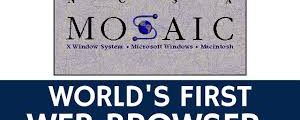How the Web was Won
The fascinating and untold story
of how an obscure military/academic computer network
became the biggest marketplace on the planet
It wasn’t DARPA or the Commerce Department or MIT’s Media Lab or Bill Gates or Steve Jobs or Silicon Valley or Wall Street that figured out how to make the Internet pay for itself.
It was INDIVIDUALS – hundreds of them each adding a piece to the puzzle – who did all the heavy lifting and innovation that transformed the Internet into a commercially viable medium.
Interviews with innovators
Interview #1 – Mark Graham
Mark spearheaded the first large scale non-military/non-academic Internet project: PeaceNet. He put AOL on the Internet and maintained the only communications line to the former Soviet Union during the 1991 coup attempt.
Interview #2 – Steve O’Keefe
Steve is the guy Jeff Bezos went to when he wanted to learn how to sell books on the Internet. He wrote the first detailed, practical book on the mechanics of promoting things on the Internet, and was one of the first people, along with Eric Ward, ever to hang out a shingle as a full time professional web publicity expert.
Interview #3 – Rick Boyce
As the old – and true – saying goes: “Nothing happens until somebody sells something.” Rick was the first person to organize a serious, professional team to tell banner ads – the original form of Internet advertising and still a dominant factor in making the Internet commercially viable.
To be on Ken McCarthy’s mailing list opt in here
- Mark Graham
- Rick Boyce
- Steve O’Keefe
Ken McCarthy – Sponsor and organizer of the first conference dedicated exclusively to the subject of web commerce, November 5, 1994
Timeline
ARPANET delivers its first message
October 29, 1969
The first ARPANET link established and first message sent (between UCLA and SRI). By the end of 1969, just four computers were connected to the ARPAnet, but the network grew steadily during the 1970s.
Read moreEmail added to ARPANET
January 1, 1971

Email protocol for ARPANET established (Ray Tomlinson). By 1976, 75% of ARPANET traffic was email.
Read moreARPANET adopts TCP/IP creating the Internet as we know it
January 1, 1983

ARPANET adopts TCP/IP. TCP/IP is the underlying protocol for the Internet allowing all computer networks regardless of format to connect to it.
Read morePeaceNet founded
February 3, 1985

PeaceNet founded in 1985 with 700 members. One of PeaceNet’s founders Mark Graham and the founder of EcoNet, Mitra Adron, joined forces in 1987 to create the Association for Progressive Communications (APC) an early attempt to use the global net for purposes other than military, governmental or academic.
Read moreGovernment changes the rules to allow commerce on the Internet
January 1, 1989

The National Science Foundation Network (NSFN), which inherited the management of the Internet from ARPANET, removed rules restricting the Internet to governmental and academic institutions only paving the way for online commerce.
Read moreCompuServe joins the Internet
November 3, 1989

CompuServe becomes the first consumer online service to give its customers access to Internet email.
Read moreWorld Wide Web launched
December 1, 1990

In 1990 a computer programmer in Switzerland named Tim Berners-Lee introduced the World Wide Web: an internet that was not simply a way to send files from one place to another but was itself a “web” of information that anyone on the Internet could retrieve. Berners-Lee created the Internet that…
Read moreInternet email becomes ubiquitous
January 1, 1993

Internet email access becomes ubiquitous among all online services
Read moreMosaic browser launched
January 23, 1993

In 1992, Marc Andreessen and a group of students and researchers at the University of Illinois developed a sophisticated browser that they called Mosaic. (It later became Netscape.) Mosaic offered a user-friendly way to search the Web: It allowed users to see words and pictures on the same page for…
Read moreNetscape founded
April 4, 1994

Netscape founded with eight employees (Marc Andreessen and Jim Clark)
Read moreThe 3220 Meeting – June 11, 1994
June 11, 1994

On June 11, 1994, Ken McCarthy organized a meeting in San Francisco with leaders of the Internet commercialization movement to discuss practical pathways for commercializing the Internet. At this meeting McCarthy identified the monetization of clicks as the most likely foundation for a commercial Internet. Reference: Time Magazine March 9,…
Read moreFirst banner ad on a commercial site
October 27, 1994

Wired Magazine’s Hotwired.com displays the first banner ad sold to a corporate client. AT&T was the advertiser. Rick Boyce led the sales effort Hotwired.com was the first web-based magazine designed to be financially self-supporting.
Read moreThe first web commerce conference – Part One
November 5, 1994

Held in San Francisco at Pac Bell headquarters. Mark Graham and Marc Andreessen were featured speakers. Ken McCarthy presented the Direct Response Model for Internet publishing and commerce which proved to be the foundation of the commercial Internet.
Read moreThe first web commerce conference – Part Two
November 5, 1994

Left to right: Ken McCarthy, Marc Andreessen, Mark Graham. Featured speakers at the November 5, 1994 web commerce conference. The event was sponsored by Ken McCarthy’s company E-Media.
Read moreNetscape IPO
August 9, 1995

Netscape went public on Aug. 9, 1995, just over a year after its founding, and only eight months after releasing the first version of its groundbreaking Web browser.
Read moreThe world’s biggest marketplace
January 1, 2019

There are currently 4.3 billion people using the Internet today, 56% of the total world population. In 2019, total estimated online sales: $3.53 trillion.
Read more




